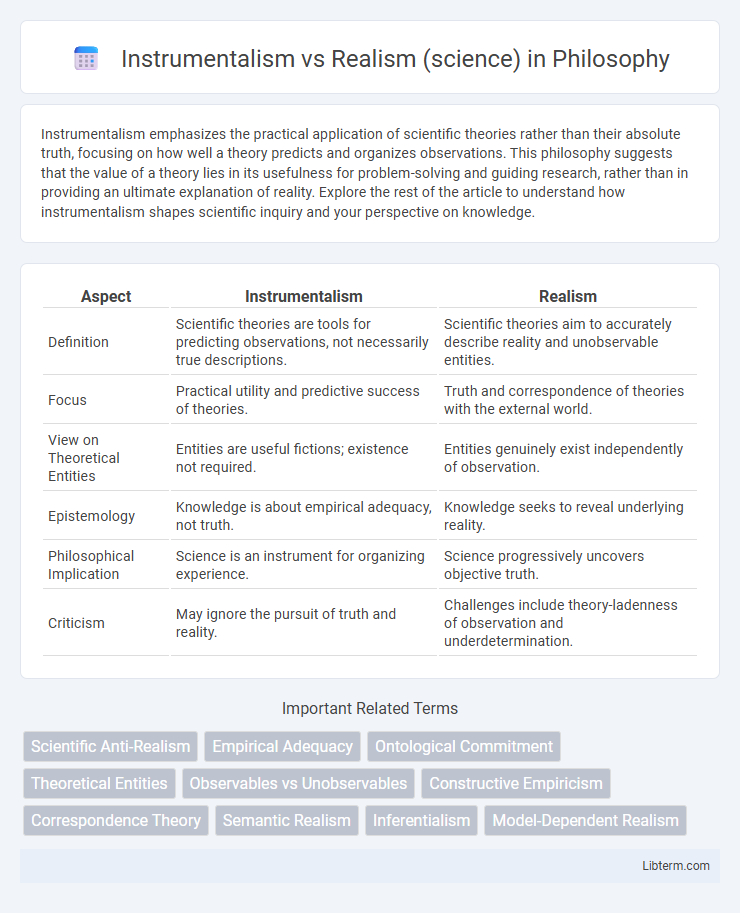Instrumentalism emphasizes the practical application of scientific theories rather than their absolute truth, focusing on how well a theory predicts and organizes observations. This philosophy suggests that the value of a theory lies in its usefulness for problem-solving and guiding research, rather than in providing an ultimate explanation of reality. Explore the rest of the article to understand how instrumentalism shapes scientific inquiry and your perspective on knowledge.
Table of Comparison
| Aspect | Instrumentalism | Realism |
|---|---|---|
| Definition | Scientific theories are tools for predicting observations, not necessarily true descriptions. | Scientific theories aim to accurately describe reality and unobservable entities. |
| Focus | Practical utility and predictive success of theories. | Truth and correspondence of theories with the external world. |
| View on Theoretical Entities | Entities are useful fictions; existence not required. | Entities genuinely exist independently of observation. |
| Epistemology | Knowledge is about empirical adequacy, not truth. | Knowledge seeks to reveal underlying reality. |
| Philosophical Implication | Science is an instrument for organizing experience. | Science progressively uncovers objective truth. |
| Criticism | May ignore the pursuit of truth and reality. | Challenges include theory-ladenness of observation and underdetermination. |
Introduction to Instrumentalism and Realism in Science
Instrumentalism in science views theories primarily as tools for predicting observations without asserting their literal truth, emphasizing practical utility over metaphysical claims. Realism holds that scientific theories aim to accurately describe an objective reality, with unobservable entities posited by these theories genuinely existing. The debate between instrumentalism and realism centers on the interpretation of theoretical terms and the epistemic commitment to scientific truth.
Historical Origins of Instrumentalism and Realism
Instrumentalism originated in the late 19th and early 20th centuries, influenced by the pragmatism of philosophers like C.S. Peirce and John Dewey, emphasizing the practical utility of scientific theories over their truth. Realism, with roots traceable to ancient philosophy but gaining modern formulation through thinkers such as Galileo and Newton, asserts that scientific theories aim to describe an objective reality independent of human perception. The historical debate between these positions intensified in the 20th century through the logical positivists and the scientific realism movement, reflecting differing views on the nature and purpose of scientific knowledge.
Core Principles of Scientific Realism
Scientific realism centers on the core principles that the world described by science exists independently of our perceptions, and that scientific theories aim to provide true explanations of both observable and unobservable phenomena. It asserts that successful scientific theories are likely approximately true representations of reality, including unobservable entities like electrons and quarks. This perspective contrasts with instrumentalism, which views theories primarily as useful tools for predicting phenomena without committing to their literal truth.
Key Concepts in Instrumentalism
Instrumentalism in science emphasizes the practical utility of theories as instruments for predicting observable phenomena rather than asserting their literal truth. Key concepts include the rejection of unobservable entities as ontologically real, the focus on empirical adequacy, and the idea that scientific theories serve as tools for organizing experience rather than providing true descriptions of reality. This approach contrasts sharply with Realism, which holds that scientific theories aim to accurately depict both observable and unobservable aspects of the world.
Major Proponents of Each Philosophy
Instrumentalism, championed by philosophers such as John Dewey and Bas van Fraassen, emphasizes the practical utility of scientific theories as tools for prediction rather than literal truth. Realism, advocated by figures like Hilary Putnam and Richard Boyd, asserts that scientific theories accurately describe an objective reality independent of human perception. These contrasting views shape ongoing debates in the philosophy of science regarding the interpretation and purpose of scientific knowledge.
Instrumentalism vs Realism: Key Differences
Instrumentalism views scientific theories primarily as tools for predicting observable phenomena without asserting their literal truth, while Realism holds that scientific theories aim to accurately describe and explain the underlying reality. Instrumentalism prioritizes empirical adequacy and practical utility, emphasizing the usefulness of models regardless of their truth value. Realism, by contrast, asserts that successful scientific theories correspond to actual entities and structures in the world, making truth a central criterion.
Implications for Scientific Theory and Practice
Instrumentalism views scientific theories as tools for predicting observations without necessarily reflecting true underlying realities, influencing practice by emphasizing model utility over truth claims. Realism asserts that scientific theories aim to accurately describe the world's fundamental structures, guiding researchers to seek objective truth and causal explanations. These contrasting perspectives affect theory choice, interpretation of empirical data, and the goals of scientific inquiry within disciplines such as physics, biology, and chemistry.
Notable Debates and Case Studies
Notable debates between Instrumentalism and Realism in science center on the interpretation of scientific theories, exemplified by the Bohr-Einstein debates over quantum mechanics' completeness and reality. The case of scientific models like the atomic theory illustrates Instrumentalism's emphasis on predictive utility, contrasted with Realism's commitment to theories representing true aspects of the physical world. The realism debate intensifies in fields such as cosmology and particle physics, where empirical evidence challenges straightforward correspondence, highlighting ongoing tensions over scientific truth and theory acceptance.
Contemporary Perspectives and Developments
Contemporary perspectives on Instrumentalism vs Realism in science highlight an ongoing debate about the nature of scientific theories and their relation to reality. Instrumentalism emphasizes the utility of theories as predictive tools without commitment to their literal truth, while Realism asserts that scientific theories aim to provide true descriptions of an objective reality. Recent developments explore nuanced positions such as structural realism and entity realism, seeking to reconcile practical success with ontological claims about unobservable phenomena.
Conclusion: The Ongoing Relevance of the Debate
The ongoing debate between instrumentalism and realism remains central to the philosophy of science, influencing how scientific theories are interpreted and applied. Instrumentalism emphasizes the practical utility of theories as tools for prediction, while realism asserts that theories aim to describe an objective reality. This tension continues to shape scientific inquiry, epistemology, and the development of new scientific models.
Instrumentalism Infographic

 libterm.com
libterm.com